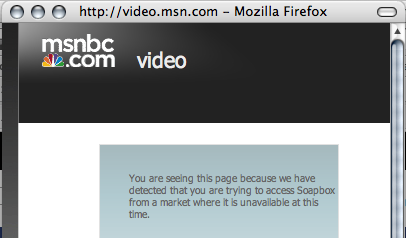Viewing U.S. presidential politics from thousands of miles away is a bit of a relief for someone like me. But I still enjoy watching the debates in webcast form to keep an eye on the tone of competition. I should say, I enjoyed it. Heading over to MSNBC.com to catch up on the recent Democratic debate, I was stopped at the door for holding the wrong internet passport:

MSNBC is not the only site to block visitors from some countries. The music site Rhapsody refuses me service while in China. Google Video also refuses my requests, though it at least apologizes:
Thanks for your interest in Google Video.
Currently, the playback feature of Google Video isn’t available in your country.
We hope to make this feature available more widely in the future, and we really appreciate your patience.
These are just the few cases I can remember off the top of my head. Many other sites have refused service since I moved to China. As of now, I don’t know how far-reaching these restrictions are, but I don’t have any reason to believe it’s just China. I have some memory of reading about sites that only work in the United States or their home country.
There are several possibilities as to why this happens. Here are a few:
- Copyright concerns. Rhapsody, for instance, may not be ready to defend its delivery of copyrighted music to some countries. Though there are no such issues with a U.S. presidential debate, MSNBC may simply have disabled video delivery abroad because of other copyright concerns, thereby unnecessarily narrowing the reach of its non-copyright-sensitive material.
- Money. Streaming video is an expensive service. It involves either a large cost in development and maintenance or large fees to an established streaming service such as Akamai to run the show. If streaming is ad-supported and advertisers aren’t interested in an audience outside of the United States, then there is a financial incentive not to serve foreign visitors. (When I listen to podcasts from U.S. National Public Radio programs, they often ask me to support my local station so that the podcast can be paid for. The smarter pitches, which acknowledge that I may not have a local station, ask me to support the program’s home station.)
- Self-censorship. Perhaps the most insidious reason would come into play if it turns out that these blocks were specifically directed toward China. It might represent a decision by U.S. content providers to censor what they provide to Chinese visitors in hopes of preventing a move by the Chinese government to block their sites overall. This is not an unreasonable fear, as we have seen with Google’s Blogger and YouTube services, among others. These sites may not always be blocked, but uncertainty about their accessibility makes it unlikely that advertisers would choose these sites to reach a Chinese audience.
Amidst recent rumors about Facebook‘s possible entry into the Chinese market with a facebook.cn service, some very smart people have been remarking on a “silo” effect when national networks are created for otherwise transnational services, making cross-border communication more difficult. As Rebecca MacKinnon writes:
If they do end up having to create different Facebook “silos” in order to be compliant with Chinese government censorship requirements (and maybe other governments with other language services too), it isn’t just a missed opportunity to provide a great global, multilingual service that many people would find incredibly exciting.
The silo-ing of social networking sites like Facebook (and MySpace China already) is a sadly missed opportunity to build bridges of communication and understanding between the Chinese-speaking world and the English-speaking world.
The same applies when information is limited to borders. The key here of course is that these decisions are business decisions. MySpace, Facebook, and MSNBC are designed to make money from their audience, not foster international connections. I just hope they find ways to do both.

Leave a Reply